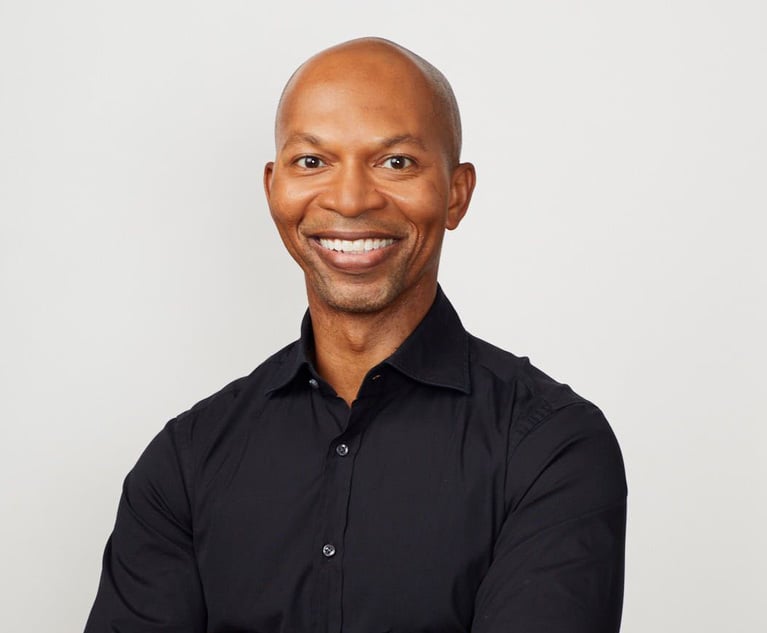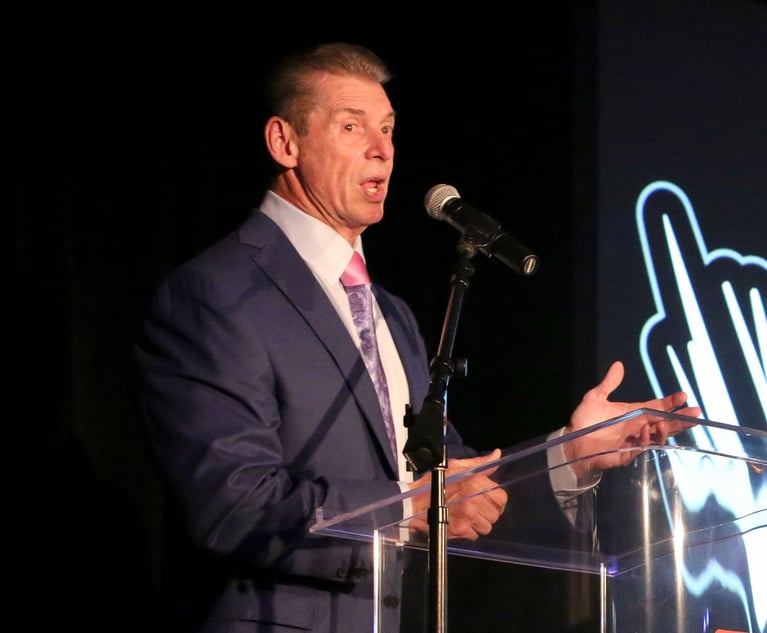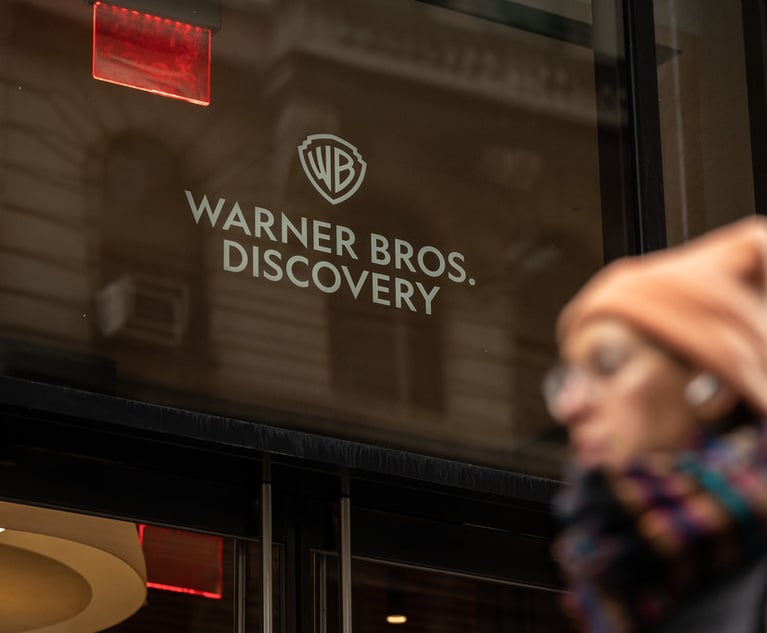 Marc E. Kasowitz.
Marc E. Kasowitz.'Ill-Fated Woodstock 50' Music Fest Sues Ad Agency, Alleging 'Sabotage,' Breach of Contract
Marc Kasowitz of Kasowitz Benson Torres, which is representing Woodstock 50, argued in court papers that Dentsu "secretly decided to abandon, and then sabotage," the festival just a few months before it was scheduled to occur.
June 18, 2020 at 06:59 PM
3 minute read
The organizers of a canceled music festival scheduled for the 50th anniversary of Woodstock sued the Japan-based advertising agency Dentsu Wednesday, arguing that the company and its affiliates "sabotaged" the festival and caused tens of millions of dollars in losses.
Marc Kasowitz of Kasowitz Benson Torres, which is representing Woodstock 50, argued in court papers that Dentsu "secretly decided to abandon, and then sabotage," the festival just a few months before it was scheduled to occur.
One Dentsu affiliate, Amplifi Live, is not named as a defendant because Woodstock 50 is pursuing its claims in arbitration, though Kasowitz noted that New York County Supreme Court Justice Barry Ostrager previously ruled that Dentsu and its affiliates, including Amplifi, acted in concert with and as agents for one another.
After more than a year of planning for the scheduled August 2019 festival, and after major acts, including Jay-Z and Miley Cyrus, had been booked, Dentsu and its affiliates became concerned about profitability and embarked on a campaign to interfere in large and small ways with the final preparations, Kasowitz argued.
"The co-conspirators planned out their strategy to surprise Woodstock 50 with the public notice of cancellation, expecting to kill the Festival so Woodstock 50 could not even attempt to produce it on its own, as Woodstock 50 had a right to do under the Agreement," Kasowitz wrote.
On April 29, 2019, Amplifi issued a press release announcing that the festival was being canceled for safety reasons, according to the suit.
The alleged safety concerns were not real, Kasowitz wrote, and the press release violated a provision of the contract stating that Woodstock 50 had to agree, in writing, to any cancellation.
The same day, Dentsu withdrew the entire balance of the festival bank account without notice, totaling about $18 million, Kasowitz wrote.
The parties went to court in May, and Ostrager issued a ruling in favor of Woodstock 50, ordering Dentsu and Amplifi to refrain from canceling the festival or claiming it was being canceled.
"Despite Amplifi's and Dentsu's wrongful cancellation and ensuing sabotage, Woodstock 50 took every reasonable effort to stage the Festival and mitigate its losses, including by seeking new financing and production assistance," Kasowitz wrote. "But those efforts could not succeed in the face of Dentsu's continued onslaught, which was in flagrant violation of [Ostrager's order]."
Dentsu and its affiliates continued a campaign of false statements in the press, Kasowitz argued, and their campaign succeeded in turning public opinion against the festival.
Dentsu did not immediately respond to a request for comment Thursday.
READ MORE:
This content has been archived. It is available through our partners, LexisNexis® and Bloomberg Law.
To view this content, please continue to their sites.
Not a Lexis Subscriber?
Subscribe Now
Not a Bloomberg Law Subscriber?
Subscribe Now
NOT FOR REPRINT
© 2024 ALM Global, LLC, All Rights Reserved. Request academic re-use from www.copyright.com. All other uses, submit a request to [email protected]. For more information visit Asset & Logo Licensing.
You Might Like
View All
SoundCloud GC Takes Legal Reins of Condé Nast at Tumultuous Time

With SDNY Stay Lifted, Sex Trafficking Civil Suit Against Vince McMahon, WWE Gets Green Light
3 minute read
Big Tech and Internet Companies Slammed With Consumer Class Actions in December

Law Firms Mentioned
Trending Stories
- 1Decision of the Day: Judge Reduces $287M Jury Verdict Against Harley-Davidson in Wrongful Death Suit
- 2Kirkland to Covington: 2024's International Chart Toppers and Award Winners
- 3Decision of the Day: Judge Denies Summary Judgment Motions in Suit by Runner Injured in Brooklyn Bridge Park
- 4KISS, Profit Motive and Foreign Currency Contracts
- 512 Days of … Web Analytics
Who Got The Work
Michael G. Bongiorno, Andrew Scott Dulberg and Elizabeth E. Driscoll from Wilmer Cutler Pickering Hale and Dorr have stepped in to represent Symbotic Inc., an A.I.-enabled technology platform that focuses on increasing supply chain efficiency, and other defendants in a pending shareholder derivative lawsuit. The case, filed Oct. 2 in Massachusetts District Court by the Brown Law Firm on behalf of Stephen Austen, accuses certain officers and directors of misleading investors in regard to Symbotic's potential for margin growth by failing to disclose that the company was not equipped to timely deploy its systems or manage expenses through project delays. The case, assigned to U.S. District Judge Nathaniel M. Gorton, is 1:24-cv-12522, Austen v. Cohen et al.
Who Got The Work
Edmund Polubinski and Marie Killmond of Davis Polk & Wardwell have entered appearances for data platform software development company MongoDB and other defendants in a pending shareholder derivative lawsuit. The action, filed Oct. 7 in New York Southern District Court by the Brown Law Firm, accuses the company's directors and/or officers of falsely expressing confidence in the company’s restructuring of its sales incentive plan and downplaying the severity of decreases in its upfront commitments. The case is 1:24-cv-07594, Roy v. Ittycheria et al.
Who Got The Work
Amy O. Bruchs and Kurt F. Ellison of Michael Best & Friedrich have entered appearances for Epic Systems Corp. in a pending employment discrimination lawsuit. The suit was filed Sept. 7 in Wisconsin Western District Court by Levine Eisberner LLC and Siri & Glimstad on behalf of a project manager who claims that he was wrongfully terminated after applying for a religious exemption to the defendant's COVID-19 vaccine mandate. The case, assigned to U.S. Magistrate Judge Anita Marie Boor, is 3:24-cv-00630, Secker, Nathan v. Epic Systems Corporation.
Who Got The Work
David X. Sullivan, Thomas J. Finn and Gregory A. Hall from McCarter & English have entered appearances for Sunrun Installation Services in a pending civil rights lawsuit. The complaint was filed Sept. 4 in Connecticut District Court by attorney Robert M. Berke on behalf of former employee George Edward Steins, who was arrested and charged with employing an unregistered home improvement salesperson. The complaint alleges that had Sunrun informed the Connecticut Department of Consumer Protection that the plaintiff's employment had ended in 2017 and that he no longer held Sunrun's home improvement contractor license, he would not have been hit with charges, which were dismissed in May 2024. The case, assigned to U.S. District Judge Jeffrey A. Meyer, is 3:24-cv-01423, Steins v. Sunrun, Inc. et al.
Who Got The Work
Greenberg Traurig shareholder Joshua L. Raskin has entered an appearance for boohoo.com UK Ltd. in a pending patent infringement lawsuit. The suit, filed Sept. 3 in Texas Eastern District Court by Rozier Hardt McDonough on behalf of Alto Dynamics, asserts five patents related to an online shopping platform. The case, assigned to U.S. District Judge Rodney Gilstrap, is 2:24-cv-00719, Alto Dynamics, LLC v. boohoo.com UK Limited.
Featured Firms
Law Offices of Gary Martin Hays & Associates, P.C.
(470) 294-1674
Law Offices of Mark E. Salomone
(857) 444-6468
Smith & Hassler
(713) 739-1250






